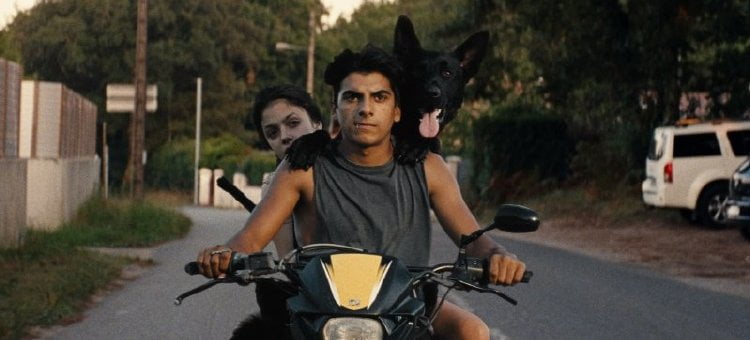Ava

As a thirteen year-old girl (Noée Abita) lies atop the wall separating a salt water pool from the ocean, a black dog comes along and feasts on the basket of french fries lying on her stomach. She awakes with a jolt, the dog's face obscuring the sky. When she gets a diagnosis of retinitis pigmentosa the next day, a disease that will take away her sight, she decides to steal the dog from homeless hustler Juan (Juan Cano) to guide her, but feelings for Juan complicate matters for "Ava."
Laura's Review: C+
Cowriter (with Paul Guilhaume)/director Léa Mysius (screenwriter "Ismael's Ghosts") makes her feature debut with this curiously odd coming-of-age tale. Beautiful at times, Mysius making reality fantastical, the film also suffers for providing no motivation for Ava's continual cruelties. Ava is on vacation with her single mother Maud (Laure Calamy) and baby sister Inès on the southwest coast of France. After her dire diagnosis, Maud cries, promising that their two weeks of vacation will be their best ever. But Maud immediately becomes preoccupied with new boyfriend Tété (Daouda Diakhaté), asking Ava to babysit for a couple of hours. With her sister screaming in her playpen, Ava releases Lupo from the tight closet she'd stashed him in and and leaves blindfolded to practice walking sightless with the dog. Back at the beach, Ava strips for a dip, but when she unties the red scarf from around her eyes she spies Juan sitting atop a bunker, watching her, and hurries off, Lupo remaining behind with his master. After a severe scolding for having left her baby sister alone, Ava and Maud go out, only to return to find Lupo covered in blood. They quickly determine the blood is not his own. Ava takes the dog back to the blockhouse and discovers Juan, badly injured. While Ava clearly has designs on Juan, he rejects her advances, attached to another woman. Yet the two become partners in crime, painting themselves with the clay Juan has used to dress his wound, holding up denizens of a nude beach like a pair of Amazon warriors. But what are we to make of this young girl who begins noting her days by the hours of their sunrises and sunsets, one who spends much of that dying light blindfolded? Her cold cruelties, which eventually include rejecting and humiliating her mother, are given no basis here, Ava's disappearing eyesight met with self reliance, not hysterical acting out. There is no psychological subtext to anything she does except for her newfound interest in the opposite sex. Mysius photographs Abita's frequently nude body with the eye of a fetishist. When prone, Ava's legs are always parted suggestively, just so. Perhaps this is meant to celebrate her budding sexuality, but one would be forgiven for thinking they were watching the gaze of Abdellatif Kechiche rather than that of a female filmmaker. Yet there is true artistry in the visuals of clay and sand covered bodies cavorting on the sand next to pristine aqua water, just as there is in the surreal horrors of Ava's nightmares. Like its young heroine, "Ava" feels half formed. Grade:

